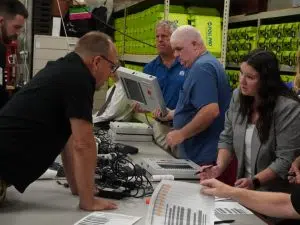INDIANAPOLIS — For more than two months, Hoosier voters attempting to apply for an absentee ballot online were met with a block of bright red text informing them that the function was down while the state complied with new — and controversial — voter identification requirements.
The service went back online Friday, with just a month and a half before the ballots themselves are due for the November 7 municipal elections. Although voters could apply by other means, some county election officials — of both major parties — called the outage “concerning” and “inexcusable” for voters. Others said they encountered no problems.
“The Secretary of State has been providing resources and support to complete the application as quickly as possible,” spokeswoman Lindsey Eaton said in a statement to the Capital Chronicle. “Cutting corners on the development, testing, bipartisan review, and approval,” she added, “is not an option.”
Hoosier voters can only apply for an absentee-by-mail ballot for 11 reasons under Indiana law, in stark contrast to the 27 states that offer “no-excuse” mail-in voting. But in Indiana, the birthplace of the voter I.D. movement, lawmakers have expanded verification requirements.
House Enrolled Act 1134, which became law in May, requires voters to submit at least one of a variety of identification numbers to apply for a ballot: the last four numbers of a social security number, an Indiana driver’s license number, a non-driver identification card number, or a unique identifier for those who registered to vote decades ago.
A voter could instead include a photocopy of their license, non-driver card, or other proof of identification — like a passport or state university-issued ID card — in the envelope with the application.
The catch? The information must match what’s on file — a potential challenge for Hoosiers who signed up to vote long ago. Without a match, election officials must work with the voter to resolve the errors, delaying the receipt of the ballot.
During the legislative session, voting rights advocates called the legislation “unnecessary” and said it could disenfranchise some, while the bill’s Republican author and supporters said it would bring mail-in voting security “up to par” with in-person voting.
See the full story here.


